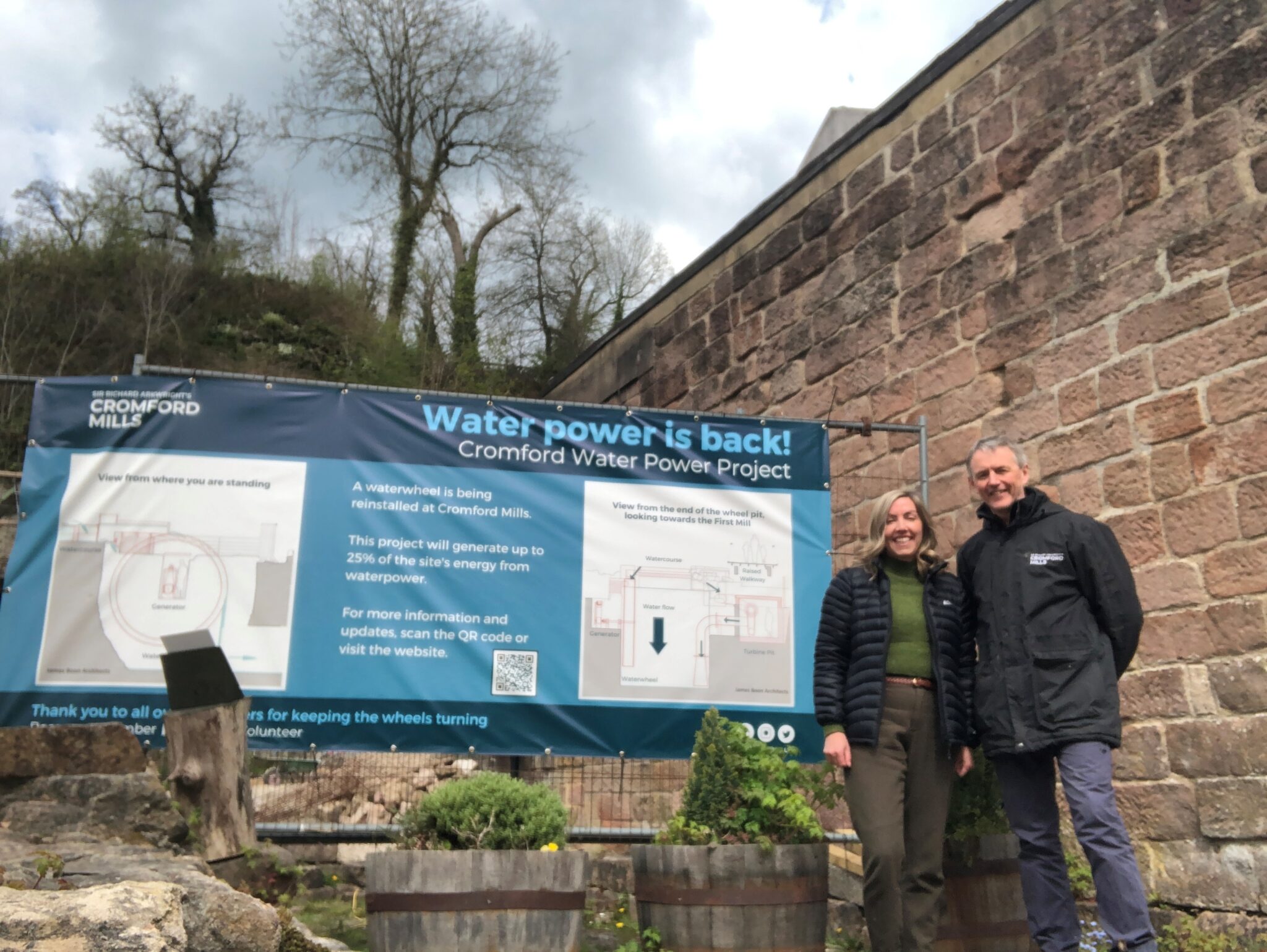Cromford Mills, built in 1771 by Sir Richard Arkwright, is no stranger to the power of water. This historic cotton spinning mill used water from the Bonsall Brook and Cromford Sough to turn three water wheels during the 18th and 19th Century.
Now, that same green energy that Arkwright harnessed from the Bonsall Brook will once again provide energy and heat to the popular tourist attraction located in the Derwent Valley.
The Arkwright Society, a charity which aims to promote education and conservation, purchased the site in 1979 and began a long-term restoration project in the 1980s. Since then, the society have transformed the site from one doomed to demolition to one of World Heritage Status.
The Cromford Waterpower project will reinstate a large 6m waterwheel and install a 15kW hydro-turbine to power the mill buildings. The scheme will also include water source heat pumps to provide heating to the site and will refurbish the hydro-turbine located at the Corn Mill in Cromford Village.
The Hub supported this vision through the Rural Community Energy Fund. This funding, provided by the Department for Energy Security and Net Zero and the Department for Environment, Food and Rural Affairs, aimed to reduce reliance on fossil fuel-based energy generation in rural communities. The project was granted funding for both stage 1 and stage 2 of the fund, meaning the Society was able to create a full investment business plan for the waterpower project.
The Arkwright Society has successfully worked with funders and partners to secure funding to bring the business plan to life through the development of the waterpower project. Severn Trent, Derbyshire County Council’s Green Entrepreneurs Fund, The Wolfson Foundation, Valliant, Derwent Hydro, and James Boon Architects are supporting Cromford Mills and the return of hydro power to the local area.
Careful planning and preparations are key in a project of this scale. Groundworks are now underway for the turbine, and it is expected to be in situ in June with the wheel being fully operational in September 2023.
Simon Gill, the Arkwright Society’s Operations Director, said: “This is a fantastic project to return waterpower to the mill that created the first factory system at the start of the Industrial Revolution.
As part of our drive to transform Cromford Mills into a more sustainable and greener site, we hope this project will spark more interest in sustainable energy sources and inspire people working on other heritage sites to play a part in shaping the future of our world. We are also looking forward to connecting the project with Cromford Village and working with the local community.
The enabling works have stepped up a gear, with permission to excavate the new turbine housing under an archaeological watching brief. This was always going to be the biggest unknown as to what we could unearth as we uncover earth from the foundation of Arkwright’s second mill. It’s great to really get started on this amazing project.
Sue Heyes, Severn Trent Community Fund Officer, said: “Sustainability is really important to us at Severn Trent, which is why we’re delighted to help fund this wonderful project that will provide hydro-power to what is such an historic site.
Making a positive difference to the local community in which we live and operate is at the core of what we do so we wish the team at Cromford Mills all the best with this project, and we look forward to seeing the final result next year.
Ruth Mulvany, Principal Rural Energy Projects Officer from the Midlands Net Zero Hub, said:
It is a privilege to visit Cromford Mill and witness the progress at this historic site. I remember discussing the project in the conceptual stage when the charity first approached the Hub for Rural Community Energy funding. The RCEF funded the project through both stages which resulted in The Arkwright Society having a feasible project that is now being realised. I am very excited to see the day that the wheel is operational.
Community energy projects are vital to building resilience in local areas, helping them to realise energy saving opportunities, renewable energy projects, and maximise income associated with these schemes. Through these projects, rural growth and job creation also enables communities to benefit from renewable energy schemes.
Through the Rural Community Energy Fund, the Hub supported 35 community-led projects through stage 1 to look into the feasibility of a renewable energy installation. Seven projects then received funding for stage 2 – which led to the development of a full investment-ready business plan.
Take a look at the feasibility studies of more RCEF projects in the community energy section of our website.

